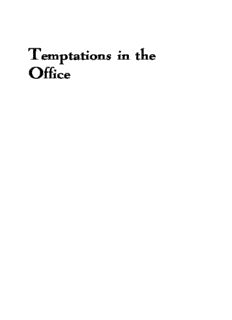
Temptations in the Office: Ethical Choices and Legal Obligations PDF
Preview Temptations in the Office: Ethical Choices and Legal Obligations
Temptations in the Office Temptations in the Office Ethical Choices and Legal Obligations STEPHEN M. GOLDMAN LibraryofCongressCataloging-in-PublicationData Goldman,StephenM.1946- Temptationsintheoffice:ethicalchoicesandlegalobligations/StephenM.Goldman. p.cm. Includesbibliographicalreferencesandindex. ISBN978-0-275-99675-8(alk.paper) 1.Businessethics.2.Corporateculture—Moralandethicalaspects.I.Title. HF5387.G6452008 1740.4—dc22 2007052854 BritishLibraryCataloguinginPublicationDataisavailable. Copyright(cid:2)C 2008byStephenM.Goldman Allrightsreserved.Noportionofthisbookmaybe reproduced,byanyprocessortechnique,withoutthe expresswrittenconsentofthepublisher. LibraryofCongressCatalogCardNumber:2007052854 ISBN:978-0-275-99675-8 Firstpublishedin2008 PraegerPublishers,88PostRoadWest,Westport,CT06881 AnimprintofGreenwoodPublishingGroup,Inc. www.praeger.com PrintedintheUnitedStatesofAmerica Thepaperusedinthisbookcomplieswiththe PermanentPaperStandardissuedbytheNational InformationStandardsOrganization(Z39.48–1984). 10 9 8 7 6 5 4 3 2 1 Tothememoryofmytwograndfathers whoselivesIcherishandwhoseexamplesguide andinspireme SamBeck(1888–1982) ofDenver,Colorado Businessman and FrankGoldman(1890–1965) ofLowell,Massachusetts Lawyer Contents Preface ix Acknowledgments xv PARTONE:ETHICALCHOICESANDLEGAL OBLIGATIONS 1 Chapter1 HowtoThinkAboutEthicalChoices 3 Chapter2 Economics,Law,andBusinessChoices 35 Chapter3 InjectingPrincipledDecision-Makinginto ManagingEthicalDecisions:TheFoursquare Protocol 59 PARTTWO:TEMPTATIONSINTHEOFFICE 71 Chapter4 SexualHarassment,GenderDiscrimination,and ParamourPreference 73 Chapter5 TheMultipleDimensionsofConflictsofInterest 107 Chapter6 IncentiveCompensation:Honesty,Greed, andFraud 131 Chapter7 Money:CuttingCornerswithYourCustomers 157 Chapter8 PowerandAbuseofPower:Challengingthe CultureofHumiliation 177 Conclusion:FacetheFacts,TelltheTruth, RunonTime 203 Index 207 Preface At the outset of his short study of the nineteenth-century German military thinker Karl von Clausewitz, the British military historian Sir Michael Howard wanted to make sure that his readers under- stood how rooted his subject was in the practical realm in which he lived and worked. Clausewitz, wrote Howard, ‘‘had the practical man’s horror of abstractions that could not be directly related to the facts of the situation, of propositions that could not be illustrated by examples, or material that was not relevant to the problem at hand.... [H]e was always concerned to link theory to action, and he deliberately ignored all aspects of his subject that were not of imme- diate relevance to the kind of war with which he himself was familiar.’’1 Although the problems of warfare may seem to some far removed from the issues of business ethics, I share Clausewitz’s horror at dis- embodied abstractions ‘‘not ... directly related to the facts of the sit- uation.’’ Many works on business ethics, especially those commonly prepared for business ethics courses in MBA programs, are heavily laced with readings from some of the world’s great moral philoso- phers. I studied many of these writings when I was a graduate stu- dent. I found them dense and maddeningly divorced from reality. I still do. When I read these books, I wonder how much more they must seem irrelevant to business leaders and aspiring business lead- ers. This book will not follow that tack. Still, the concepts of such thinkers are essential to accomplish our task. But we’ll address them in a manner that will help businesspeople understand how to think x Preface about such problems or, sometimes, to help them understand the rational foundation for what they already believe. There’s a second prominent genre of books on business ethics. Such works are anecdote books. Drawing heavily on descriptions of dilemmas that businessmen and businesswomen have faced, such books are largely devoid of any theoretical underpinning. Starting with real-life situations, they specialize in showing that, in the real world of business, values we care about may pull in opposite direc- tions in tough cases. I call this the ‘‘Mary realized she had a prob- lem’’ approach. To resolve such dilemmas, this approach trades on intuition. The reader is asked, essentially, to decide whether the choice made by the person in the scenario was or was not correct. The problem with this approach is that it provides little guidance for solving the different problems you inevitably encounter yourself. This book adopts a third approach. Its aim is to improve the ability of the reader to think clearly, coherently, and effectively about con- crete ethical problems faced by businesspeople. It uses the insights of the two principal disciplines that address questions of right and wrong: ethics (sometimes called moral philosophy) and law. Ethics and law are similar in that both address what we ought to do. They differ in that ethics helps us to decide what we ought to do because we conclude that a given choice is morally sound. Law tells us what we must do to avoid a sanction, such as being held liable for damages or convicted of a crime. Still, ethics and law are linked in two ways. First, the decisions businesspeople make are interlaced with considerations from both spheres. Second, while the law’s ‘‘must’’ nearly always derives from society’s decision to put the clout of the law behind a certain ethical view, the ethical domain maintains its significance regardless of the laws content. Gender discrimination and sexual harassment did not cease to raise ethical issues just because Congress and thecourts decided to write into law an ethical view pro- hibiting them. The relationship of both law and ethics to these ques- tions is discussed more fully in Chapter 4. Wags and cynics like to proclaim that the term ‘‘business ethics’’ is an oxymoron. But concern about individual values in business, which we sometimes refer to as business ethics, is vital for compa- nies and for individual careers. What we do and how we do it affects our coworkers, our customers, our suppliers, our competitors, and, as recent studies prove, ourselves. There are three principal ways that companies get into big, head- line-making trouble. The first and most obvious is where a market
Description: